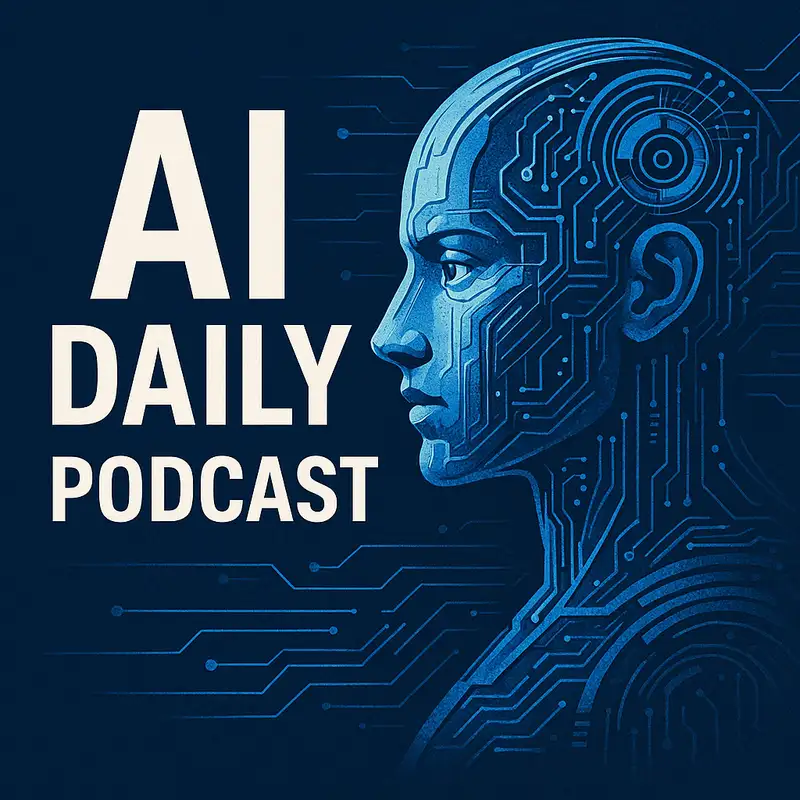🤖 Virtual Bands, Academic Manipulation & Creative Authenticity
Welcome to AI Daily Podcast, your essential source for the latest developments in artificial intelligence. I'm your host, bringing you the most compelling AI stories shaping our digital future. Today we're diving into some fascinating developments that highlight the complex intersection of AI and human creativity, from virtual bands topping music charts to concerning practices in academic publishing. But first, let me tell you about today's sponsor, 60sec.site, an incredible AI-powered tool that lets you create stunning websites in just 60 seconds. Whether you're a small business owner, creative professional, or just someone who needs a web presence fast, 60sec.site harnesses the power of AI to build beautiful, functional websites with minimal effort. Visit 60sec.site today and experience the future of web creation. Now, let's jump into today's AI headlines. Our first story comes from the music industry, where the lines between human and artificial creativity are becoming increasingly blurred. A band called The Velvet Sundown recently went viral on Spotify, amassing over one million streams in just a few weeks. Their success seemed like a typical modern music industry fairy tale, until it was revealed that everything about the band was artificially generated. We're talking about their music, their promotional images, their entire backstory, all created by AI. The revelation has sparked an intense debate about authenticity in the creative industries. Music industry insiders are now calling for streaming platforms to be legally required to tag AI-generated content, arguing that consumers have the right to know what they're listening to. This raises fascinating questions about the nature of artistic expression in the age of AI. Does it matter if music moves you emotionally, even if it wasn't created by human hands? And what does this mean for the future of the music industry as AI becomes more sophisticated? Moving from the music world to academia, we're seeing some troubling developments in scientific publishing. Reports have emerged of academics hiding AI prompts in research papers, specifically designed to manipulate peer review processes. According to investigations by Nikkei, researchers from 14 academic institutions across eight countries have been embedding hidden white text in their papers with instructions for AI tools to give positive reviews. These hidden prompts reportedly encourage reviewers not to highlight negatives, essentially gaming the system that's supposed to ensure scientific rigor. This practice highlights a growing concern about the integrity of academic publishing as AI becomes more prevalent in research workflows. The peer review process is fundamental to scientific advancement, and any manipulation of this system could have serious consequences for the quality and reliability of published research. But the problems in academic publishing go even deeper. Scientists are reportedly feeling overwhelmed by the sheer volume of papers being published, with millions of new research papers appearing every year. This information overload has led to quality control issues that sometimes produce embarrassing results. One particularly notable case involved a paper that gained global attention not for its scientific merit, but for featuring an AI-generated image of a rat with anatomically impossible features. The widespread mockery that followed brought public attention to broader concerns about the quality of scientific publishing in the AI era. These incidents collectively paint a picture of academic institutions struggling to adapt to the rapid integration of AI tools in research and publishing. While AI can certainly enhance scientific research and accelerate discovery, these examples show us the importance of maintaining human oversight and ethical standards. The challenge moving forward will be finding ways to harness AI's benefits while preserving the integrity that makes scientific research valuable to society. What's particularly interesting about all these stories is how they reflect broader themes about AI's integration into human creative and intellectual pursuits. Whether it's music, academic research, or any other field, we're seeing similar patterns emerge. AI is becoming increasingly sophisticated at mimicking human output, but questions about transparency, authenticity, and quality control remain paramount. As we wrap up today's episode, it's clear that we're living through a transformative period where AI is reshaping fundamental aspects of how we create, consume, and validate information. The key will be developing frameworks and standards that allow us to benefit from AI's capabilities while maintaining the human judgment and ethical oversight that ensure quality and authenticity. Don't forget to visit news.60sec.site for our daily AI newsletter, where we dive deeper into these stories and bring you the latest developments in artificial intelligence. Until next time, this has been AI Daily Podcast, keeping you informed about the AI revolution happening all around us.
